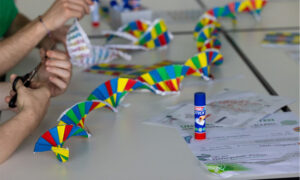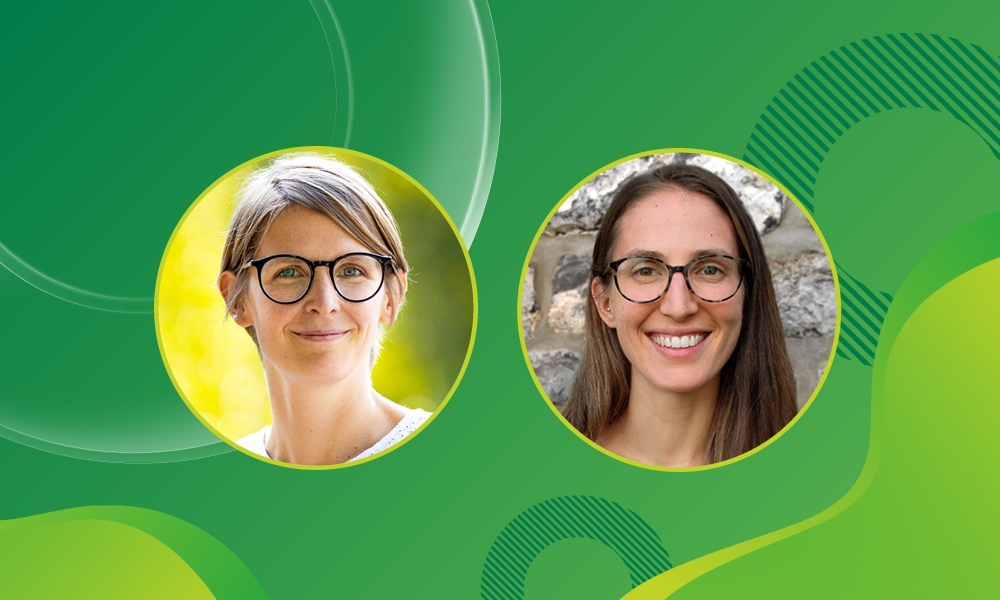
Read the latest Issue
EMBL recipients of 2020 L’Oréal–UNESCO For Women in Science fellowships note critical need for support systems and mentors

Agnese Loda had just given birth to a beautiful girl, yet despite the new joys of motherhood and love for her fledgling family, she was frustrated. Her research wasn’t progressing in the way she hoped, and she felt like she was falling behind her peers. She seriously questioned whether she could be both a good scientist and a good mother. However, her supervisor – also a woman and now EMBL Director General – offered reassurance and encouragement, reminding Agnese that both her experiences and her reactions to those experiences were normal. Things would get better. Science needed her and she could weather this balancing act.
According to UNESCO data, fewer than 30% of the world’s researchers are women, even though this is a career choice that can offer some flexibility – for example in working hours – that is not available to women in other careers.
As Agnese found out, her supervisor, Edith Heard, was right about her ability to forge ahead, but she also proffered a lesson that most, if not all, women in science ultimately learn: support systems are critical.
The year 2020 tested people around the globe, but for women in science many challenges were magnified. This is why EMBL chose to host a one-day virtual conference about the impacts of the pandemic on women in science, and what might be done to address these. Many speakers and participants stressed the need to build a community of allies and a support network of people who can advise and sustain a woman throughout her career.
It was in this particularly trying year that both Agnese and another EMBL postdoc, Camille Goemans, were awarded L’Oréal–UNESCO For Women in Science fellowships. Created in 1998, these fellowships are intended to recognise women scientists who are juggling family demands or overcoming gender bias to produce exceptional science. Both Agnese and Camille noted that, as mothers in science, they’ve relied heavily on support networks.
“Even the fellowship itself introduced me to other women at the same stage in their careers with whom I could share my own doubts and difficulties, as well as a shared determination to be good scientists,” recounts Agnese, who explores the X chromosome in EMBL’s Heard group to better understand how the genome is regulated and controlled. “I’m only at the beginning of my career and consider myself very lucky to have met many inspiring and generous women along the way – all my heroes, giving me a lot of good vibes and energy!”
For Camille, supportive networks have included not just group leaders, but also a husband who set aside his own career to give her the space to focus on her research at this critical juncture.
“I think it’s important to realise that, as long as women are expected to spend more time than men on home duties or with their children, they will never feel equal in the workplace,” says Camille, a postdoc who divides her time between caring for two children under the age of five and researching the emergence of antibiotic resistance in gut microbes in EMBL’s Typas group.
“I’ve been very lucky to work in environments where I never felt discriminated against for being a woman or a parent. I’ve had great group leaders – both for my PhD and my postdoc – who were very supportive of both my career and family choices. Overall, I think it’s extremely important to be happy and fulfilled to do good science, so I don’t think it is a good strategy to put your personal life on hold in the name of science.”
In November, Agnese participated in a panel discussion about the challenges for women in science, which was sponsored by the German Federal Ministry of Education and Research. She too noted how members of scientific leadership can act as allies to women, and can signal their encouragement with the policies and services they provide to allow women researchers to do their best work.
“EMBL, for example, is very child friendly; most supervisors have children of their own and understand that young scientists want children too,” Camille notes. “We have our own day care centre here and a kindergarten.”
Networking, allyship, and mentoring among women is something that must begin early on. Already, postdocs Agnese and Camille find themselves advising those at earlier stages in their careers, whether it’s offering encouragement or sharing tips for mastering the balancing act of family and career.
“To me, the most important step towards equality is the education of young girls around the world, where they should get the idea that they will have the opportunity to access any job in the future and that nothing is ‘only for men’,” Camille says. “That’s why we need visible role models, like female group leaders and women in higher management of research institutes. But it’s also just as important to see male group leaders pushing for more equality towards women and promoting the idea that having a family and doing science are not mutually exclusive.”
Celebrate women in science! This article is the second of a series, leading up to International Women’s Day on 8 March, to spotlight how mentoring and other relationships fortify what women and girls are able to accomplish, often because of the networks they build and the skills they develop, which sustain confidence and provide new opportunities.
Looking for past print editions of EMBLetc.? Browse our archive, going back 20 years.
EMBLetc. archive